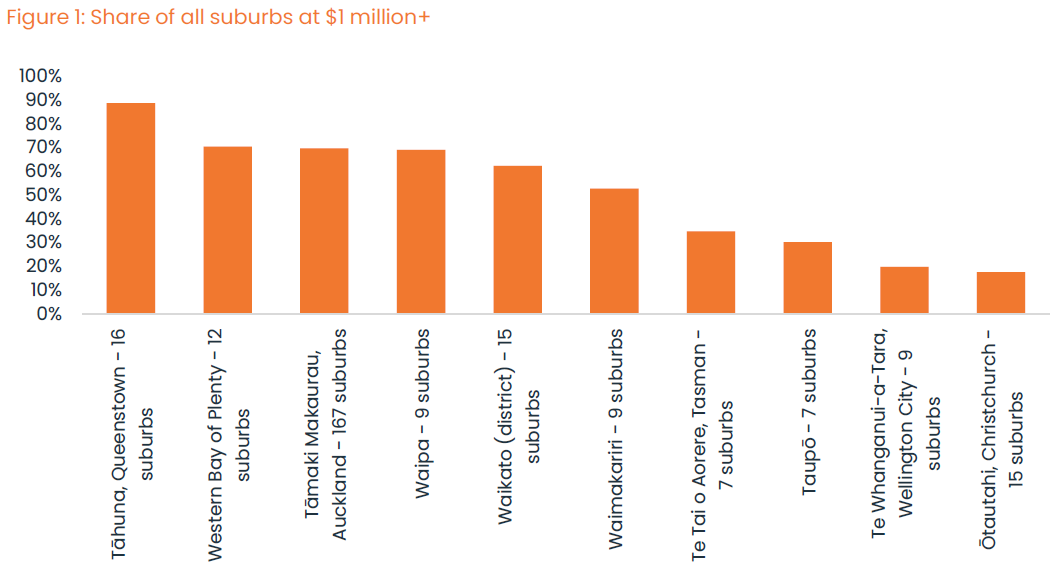In today's Pulse article, Head of Research Nick Goodall dives into Aotearoa NZ’s $1 million+ housing markets.
$1 million isn’t what it used to be when it comes to owning property. That being said the $1 million figure still carries an outsize significance for many people. Today’s Pulse article looks at where these properties are – with no prizes for guessing that areas such as Tāmaki Makaurau, Auckland and Tāhuna, Queenstown feature prominently.
$1 million + sales activity is dominated by Tāmaki Makaurau Auckland
Starting with recent agreed sales (contract date since 1st June), it’s no surprise to see that many of the $1 million+ deals have been in the ‘usual suspects’, including areas such as Tāmaki Makaurau Auckland, Te Whanganui-a-Tara Wellington, Ōtautahi Christchurch, and Tāhuna Queenstown. Indeed, the Tāmaki Makaurau Auckland super-city accounts for 52% of all $1 million+ sales across NZ in the past three months, with around half that figure coming in just two sub-markets; Auckland City and North Shore, markets with some very sought-after suburbs.
Meanwhile, Ōtautahi Christchurch accounts for around 7% of all $1 million+ sales recently, with 4% in Tāhuna Queenstown. That figure may not seem particularly high for an expensive area such as Queenstown, but when you consider it only has about 0.6% of NZ’s total stock of dwellings, it certainly punches above its weight in terms of $1 million+ sales activity.
Te Whanganui-a-Tara Wellington City also accounts for just over 4% of $1 million+ sales activity of late, while other main centres such as Kirikiriroa Hamilton and Tauranga also feature on the list.
But other, smaller areas with decent levels of $1 million+ sales that might not necessarily spring to mind straightaway include Waipa and Waikato Districts, Pārāwai-Kapanga Thames-Coromandel, Western Bay of Plenty, Taupō, and Herewini Selwyn. In some cases, those areas are heavy with lifestyle blocks or large detached houses on sizeable sections, while others are of course popular holiday/retirement locations with high-value housing.
$1 million+ stocks are also prominent in Tāmaki Makaurau Auckland, but elsewhere too
Looking at stock levels instead of recent sales tells an interesting story. For this section, we’re looking at suburb-level data, using estimated median values for each area – based on our Automated Valuation Model (AVM), which provides a likely price were that property to sell now. These AVMs are used by banks in the mortgage lending process and are available for 97% of residential property across NZ.
Once you apply a minimum size filter of 200 existing properties for each area, we are looking at 1,191 suburbs across Aotearoa NZ, with 337 of those having a current median value of at least $1 million; or in other words around 28% of suburbs across the country are in the $1 million+ ‘club’.
There are no surprises that Auckland has 167 (50%) of those suburbs, which equates to 70% of all suburbs across the super-city. Put another way, seven in every 10 Tāmaki Makaurau Auckland suburbs has a median property value of $1 million+, and the very top end of the spectrum includes suburbs such as Herne Bay, Saint Marys Bay, Westmere, and Remuera.
But in terms of the share of suburbs with a median value of $1 million+ (and also a reasonable number of $1 million+ suburbs), Tāmaki Makaurau Auckland isn’t at the top of the list. That’s actually Tāhuna Queenstown (89%) and Western Bay of Plenty (71%). In Tāhuna Queenstown’s case, the generally high level of property values makes it inevitable that a large share of suburbs would sit in the $1 million+ bracket, and for Western Bay of Plenty a key driver is simply the composition of the property stock – lifestyle blocks (which are larger and higher value) account for around 35% of properties in that area, versus less than 10% nationally.
Waipa, Waikato, Waimakariri, and Te Tai o Aorere Tasman also have relatively high shares of lifestyle properties (around 25% or more), which helps explain their presence in the first chart, while Taupō is a popular (and expensive) property market in general with plenty of holiday homes, with Te Whanganui-a-Tara, Wellington City and Ōtautahi, Christchurch also featuring due to larger size and presence of well-established, up-market areas.

An arbitrary number
The rise in nominal property values over time means that the $1 million ‘barrier’ doesn’t mean as much as it did in the past. That said, it’s still a useful threshold to look at, and it’s another way of showing how stretched housing affordability really is for the average household in key urban markets such as Tāmaki Makaurau Auckland, but also in areas such as the Waikato Region and Tāhuna Queenstown too.
The new debt to income ratio caps for mortgage lending will have an important role to play in providing some sort of restraint for house prices over the medium to long term. But ultimately it’s about getting a higher physical supply of property in relation to demand, and on that front, it’s certainly been encouraging to see the Government pushing hard – with measures such forcing councils to designate enough land for 30 years of development.
